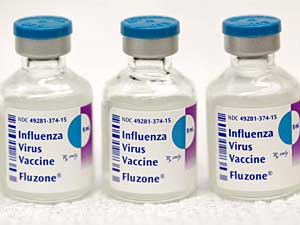|
Audio
Photos
Resources
Your Voice
|
Flu vaccine supply only half of what's needed
October 11, 2004
The Minnesota Health Department says the state has only about half of the flu shots it needs to vaccinate the state's high risk population. The state surveyed nursing homes, health care clinics and local public health providers to see how many flu shots are available. The department took the survey after British health authorities shut down one of the two manufacturers that provide the vaccine in the United States. The survey says those in nursing homes are at the greatest risk, since those facilities have a limited amount of the vaccine.
St. Paul, Minn. — The good news is the state Health Department has found 414,000 doses of the flu vaccine in the state. The bad news is the state is short 377,000 doses for the elderly, children and those who have weak immune systems.
Kris Ehresmann with the Minnesota Health Department says the survey found that clinics that treat families and children have better supplies of the vaccine. She says she's most concerned about those who live or work in long term care facilities.
 | |||
"Only about 7 percent of the facilities that we have information on had any vaccine, so yes, it's a pretty significant issue," she says.
Ehresmann says long term care facilities have a limited amount of the vaccine because they relied on the problem manufacturer. She says the vaccine made by Chiron Corp. was targeted for older people. People of any age can use the other vaccine.
Ehresmann says many HMOs and health care clinics ordered the vaccine suitable for all age groups so they could treat children, their parents and their grandparents. Now, Ehresmann says they're working with those clinics to see if any available doses can be given to nursing home residents.
"There are limitations to what we can redistribute, because there isn't a lot of vaccine out there," says Ehresmann. "But that's really our first step, to try and look at what's available in a community and how that can be shared among the needy high-risk folks in that community."
But Ehresmann says the Health Department can't force a hospital or health care clinic to redirect the vaccine to nursing homes.
 | |||
Rick Carter, with CareProviders of Minnesota, says he's hopeful some of the vaccine will be diverted for the estimated 130,000 doses needed for nursing home residents and staff. Nevertheless, Carter says he's frustrated that there have been vaccine shortages over the last two years.
"It's certainly a huge moral and ethical issue, that the most vulnerable of our citizens are certainly going to not receive something that is theoretically readily available in the marketplace -- and we're really testing our public health resources," says Carter.
Others echo Carter's frustration. The Mayo Clinic's Gregory Poland sits on a federal vaccine advisory board. He says the U.S. needs to take greater steps to ensure that an adequate supply of flu vaccine is manufactured every year.
Poland says drug makers have been reluctant to enter the market, because it's not a moneymaker and can be a financial risk, since demand for the vaccine can fluctuate. Poland says the federal government needs to give drug makers incentives to manufacture the flu vaccine.
 | |||
"We must find a way to have a stable supply of influenza vaccine," says Poland. "In the last five years, we have had three manufacturers withdraw from the market or not be able to participate."
Poland says the federal government could guarantee the purchase of the vaccine if it's not sold. He also says another incentive could include immunity from lawsuits regarding the flu vaccine.
Poland says the public should not be overly concerned about the shortage at this point. He says early indications show that this year's influenza outbreak does not appear to be as severe as last year's. Poland also says health care providers should be able to treat the majority of the sick and vulnerable who get the flu with anti-viral medication.
But he doesn't discount the importance of receiving a flu shot, since 30,000 people died last year due to flu-related illnesses, and another 225,000 people were hospitalized.
|
News Headlines
|
Related Subjects
|

